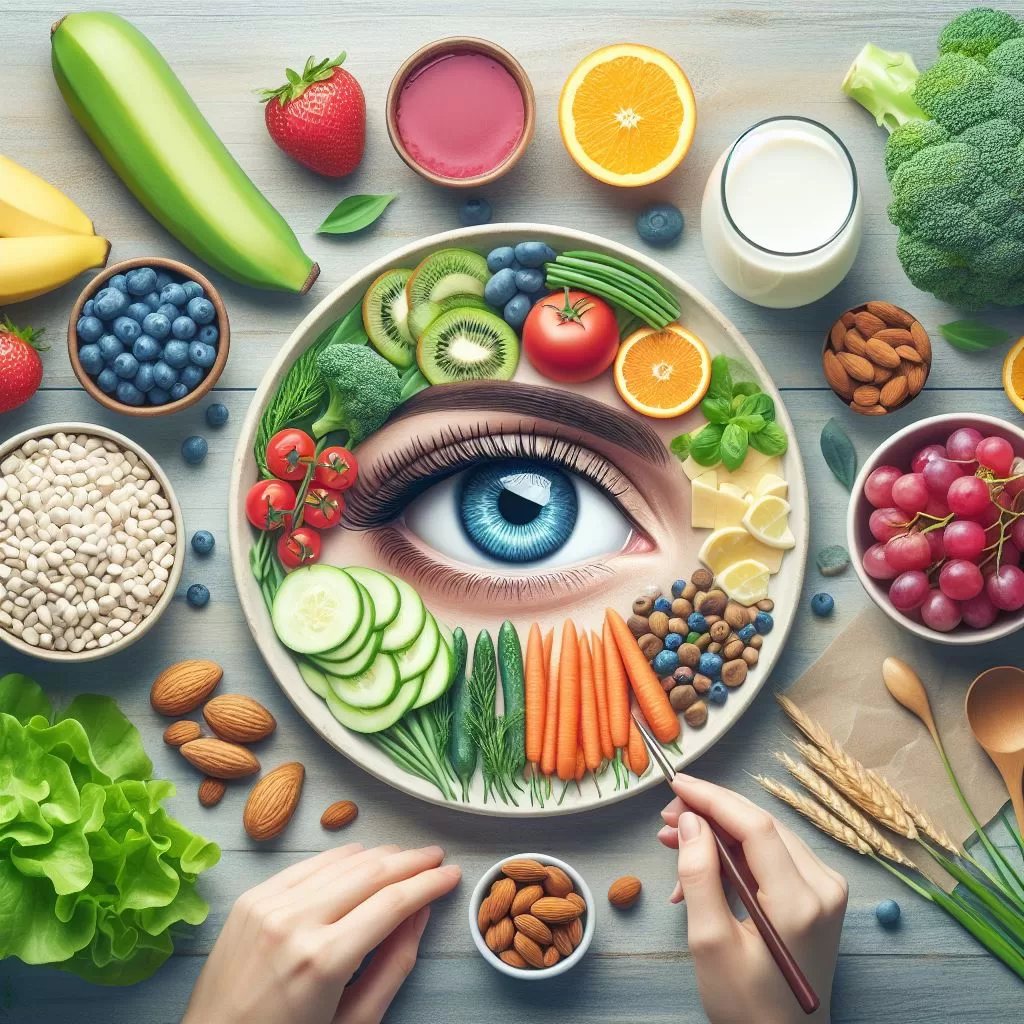In a world where our vision is called upon like never before, it is crucial to take care of our eyes as much as we do our bodies. While glasses and regular visits to the eye doctor are essential, diet plays an equally fundamental role in maintaining our eye health. Certain foods act like real superheroes for our eyes, enriching our vision with key nutrients. However, it is equally important to recognize and avoid those that can compromise our visual well-being.
This article explores beneficial foods to include in our daily diet to support eye health, as well as those to limit to prevent potential risks.
I. Super Foods for Your Eyes:
1. Carrots Are Just the Beginning:

Carrots are famous for their eye health benefits, and that’s no myth. They are an exceptional source of beta-carotene, which is converted by the body into vitamin A, a crucial nutrient for maintaining good vision. Vitamin A helps maintain the cornea, and the transparent surface of the eye and contributes to night vision. Additionally, it plays a role in preventing xerophthalmia, a disease that can lead to blindness.
2. Green Leafy Vegetables:
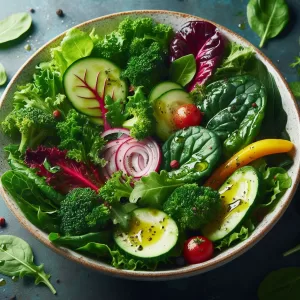
Green leafy vegetables, such as spinach, kale, and mustard greens, are superfoods for the eyes. Their secret? They are full of lutein and zeaxanthin, two carotenoids essential for eye health. These powerful antioxidants act as a natural filter of harmful blue light, protecting the retina from oxidative damage that can lead to macular degeneration and cataracts, two of the leading causes of vision loss in adults.
But that’s not all. In addition to being rich in lutein and zeaxanthin, green leafy vegetables are also an excellent source of vitamins and minerals beneficial to the eyes, including vitamin C, vitamin E, and zinc. Vitamin C and vitamin E have antioxidant properties that help reduce the risk of eye diseases. Zinc, on the other hand, plays a vital role in transporting vitamin A from the liver to the retina, supporting protection against night blindness and promoting healthy vision.
Incorporating a daily serving of green leafy vegetables into your diet can therefore significantly contribute to maintaining the health of your eyes. Whether adding them to your smoothies, salads, or cooked meals, these versatile vegetables don’t just offer protection against age-related eye diseases; they also provide your body with an array of essential nutrients for overall well-being.
Opting for a diet rich in green leafy vegetables is a delicious and natural strategy to take care of your vision. So why not start incorporating these superfoods into your meals today to benefit from their incredible eye health benefits?
3. Berries and Citrus Fruits:
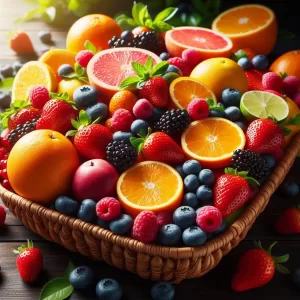
Berries and citrus fruits, with their explosion of flavors and colors, are not only a treat for the taste buds but also for the eyes. Rich in vitamin C, these juicy, flavorful fruits provide powerful protection against some of the most common eye problems, including cataracts, a condition characterized by clouding of the lens of the eye that can lead to blurred vision.
Vitamin C is a remarkable antioxidant that plays a key role in eye health. By neutralizing free radicals – unstable molecules that can damage cells in the eye – this antioxidant helps prevent oxidative stress that contributes to the development of cataracts and the progression of age-related macular degeneration (AMD). But vitamin C doesn’t stop there; it also contributes to the production of collagen, a protein vital for maintaining the health of the cornea and sclera, the structures of the eye.
Blueberries, in particular, are famous for their high antioxidant content, including vitamin C, which helps strengthen blood vessels in the retina. Strawberries, oranges, and grapefruits are not left out; they provide a substantial dose of this essential vitamin, promoting clear vision and protecting against eye damage.
Including a variety of berries and citrus fruits in your diet is a delicious and natural way to support your eye health. Whether as a snack, fruit salad, or juice, these fruits not only brighten up your table but also work behind the scenes to keep your eyes healthy. By eating a diet rich in fruits loaded with vitamin C, you are taking an important step toward preventing cataracts and protecting your vision.
So, the next time you enjoy a bowl of juicy strawberries or a glass of fresh orange juice, know that you’re not just satisfying your sweet tooth; you are also investing in the health of your eyes.
4. Fatty Fish:

Oily fish, such as salmon, mackerel, herring, and sardines, are valuable allies for eye health. Rich in omega-3 fatty acids, these marine superfoods provide significant protection against a range of eye problems, including maintaining retinal health and preventing eye diseases.
Omega-3s, particularly EPA (eicosapentaenoic acid) and DHA (docosahexaenoic acid), play a crucial role in maintaining the cellular structure of the retina. DHA is a major component of retinal cell membranes and their adequate presence are necessary for visual development and maintenance of visual function throughout life.
Omega-3s also help prevent dry eye, a condition that can lead to discomfort and blurred vision. Additionally, studies indicate that omega-3 fatty acids may reduce the risk of age-related macular degeneration (AMD), a leading cause of vision loss in older adults, and glaucoma, by improving drainage. intraocular fluid which, if poorly regulated, can increase pressure in the eye and damage the optic nerve.
Incorporating fatty fish into your diet regularly is not only beneficial for your eye health; It’s also a great way to support your cardiovascular health, thanks to omega-3’s ability to reduce triglyceride levels and fight inflammation.
To get the most out of the eye health benefits of fatty fish, nutritionists recommend consuming at least two servings per week. Whether you grill them, steam them, or include them in salads or pastas, these fish offer a variety of culinary possibilities that will satisfy your palate while nourishing your eyes.
5. Eggs:

Eggs, often celebrated for their versatility and nutritional value, are also unsung heroes when it comes to eye health. They are an excellent source of lutein and zeaxanthin, two key carotenoids that play an essential role in protecting the retina. Additionally, eggs provide a good amount of zinc, a mineral that supports visual health by boosting retinal protection and helping reduce the risk of age-related macular degeneration (AMD).
Lutein and zeaxanthin, found in egg yolks, are particularly beneficial because they accumulate in the retina, where they filter harmful light rays and protect the eyes from oxidative damage. This filtering action helps reduce the risk of AMD, a major cause of vision loss in older adults. These antioxidants may also help prevent cataracts, another common vision disorder.
Zinc, another essential nutrient found in eggs, plays a crucial role in transporting vitamin A from the liver to the retina to produce melanin, a pigment that protects the eyes. Zinc also helps maintain retinal health and may reduce the risk of macular degeneration.
In addition to these eye health-specific nutrients, eggs are a source of high-quality protein and contain other essential vitamins and minerals. They can be prepared in a variety of ways, making them easy to incorporate into the daily diet, whether at breakfast, in salads, or as a component of various main dishes.
To maximize the benefits of eggs for eye health, it is advisable to consume them regularly, but in moderation, as part of a balanced diet rich in fruits, vegetables, oily fish, and other foods beneficial to the eyes. So, eggs not only enrich our diet with their delicious taste; but they also contribute significantly to the health and protection of our eyes, reducing the risk of eye diseases and preserving our vision.
6. Nuts and Seeds:
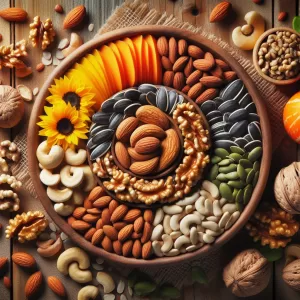
Nuts and seeds are real nutritional treasures, particularly beneficial for eye health. Rich in vitamin E, a powerful antioxidant, they play a key role in protecting the eyes against oxidative damage caused by free radicals. This protection is essential for delaying age-related degenerative processes, such as age-related macular degeneration (AMD) and the formation of cataracts.
Almonds are often touted for their high vitamin E content, but other nuts and seeds, such as walnuts, pistachios, sunflower seeds, and flaxseeds, are also rich sources of this essential antioxidant. Vitamin E helps protect the cell membranes of cells in the eye, supporting visual health and preventing long-term damage.
In addition to vitamin E, nuts and seeds are a good source of omega-3 fatty acids, especially chia seeds, flax seeds, and walnuts. These essential fatty acids support retinal health and can prevent dry eye syndrome, improving the quality of vision.
Regular consumption of nuts and seeds as part of a balanced diet can therefore offer double protection for the eyes: the antioxidants they contain help fight oxidative damage, while the essential fatty acids support the structure and function of the eye. To incorporate these beneficial nutrients into your diet, consider adding a small handful of nuts or seeds to your salads, yogurts, or snacks.
It is important to note that, just like other aspects of health, protecting and maintaining eye health requires a holistic approach. So, nuts and seeds, with their rich and diverse nutritional profiles, represent a valuable part of this overall strategy, helping to preserve your vision and protect your eyes against age-related conditions.
II. Protecting your Vision: Foods to Avoid for Eye Health.
The health of our eyes is precious and plays a crucial role in our daily quality of life. While some foods can strengthen our vision, others can negatively affect it. Knowing which foods to avoid can be just as important as knowing which foods to favor.
Here’s a list of foods that can harm your eye health and why they’re best left off your plate:
1. Foods High in Sugars and Processed Fats:
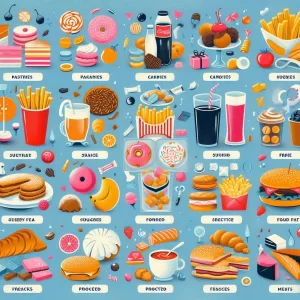
Maintaining eye health goes beyond incorporating beneficial foods into your diet; it’s also about knowing which foods to avoid. Foods high in sugars and trans fats are at the top of the list of products to limit to preserve your vision. Here’s why their excessive consumption can be harmful to your eye health.
– Increased risk of obesity:
Trans fats and refined sugars contribute to obesity, a major risk factor for several eye diseases. Excess weight increases the likelihood of developing conditions like diabetic retinopathy, which occurs when high blood sugar levels damage the blood vessels of the retina, and glaucoma, associated with increased pressure in the eye which may cause loss of vision.
– Deterioration of blood vessels:
Refined sugars cause spikes in blood sugar levels which, over the long term, can damage blood vessels throughout the body, including those that supply the eye. This damage can reduce blood flow to the retina, impairing vision and increasing the risk of eye conditions like diabetic retinopathy.
– Inflammation :
Trans fats are known to contribute to inflammation, a process that can have detrimental effects on eye health. Inflammation can exacerbate the risk of age-related macular degeneration (AMD) and other chronic eye diseases.
To maintain the health of your eyes, it is recommended to minimize the consumption of foods high in sugars and trans fats. This includes not only sweets and baked goods but also processed foods and fast foods, often hidden sources of these harmful components. Instead, focus on a diet rich in fruits, vegetables, nuts, seeds, and fatty fish, which provide essential nutrients to support healthy vision.
2. Carbonated Drinks and Industrial Fruit Juices:

To maintain eye health, it is essential to pay attention not only to what we eat but also to what we drink. Soft drinks and industrial fruit juices, often perceived as refreshing and convenient choices, deserve special attention due to their potentially negative impact on vision. Here’s why it’s recommended to avoid them to maintain good eye health.
– Rich in added sugars:
These drinks contain high amounts of added sugars, which can lead to weight gain and obesity. Excess weight increases the risk of developing eye diseases, such as diabetic retinopathy and glaucoma. Additionally, blood sugar spikes resulting from sugar consumption can damage blood vessels in the eye, compromising blood flow and affecting retinal health.
– Contribution to inflammation:
Excessive sugar consumption can lead to inflammation throughout the body, including the eyes. Inflammation is a risk factor for many eye conditions, including age-related macular degeneration (AMD) and cataracts.
– Increased risk of type 2 diabetes:
Sugary drinks are linked to an increased risk of developing type 2 diabetes, a disease that directly affects eye health. Diabetes can lead to serious eye conditions, such as diabetic retinopathy, which can cause blindness if left untreated.
To protect your eyes and your overall health, choose drinks without added sugar, such as water, plain sparkling water, herbal teas and fresh fruit juices in moderation. Water, in particular, plays a crucial role in maintaining hydration and supporting eye function, helping to deliver essential nutrients to the eye and flush out toxins.
3. Processed Meats:

Processed meats, often prized for their taste and convenience, hide lesser-known eye health risks. Products such as sausages, bacon, and cold cuts are generally high in sodium and preservatives, two components that can have detrimental effects on vision. Here is why it is advisable to limit their consumption to preserve eye health.
– High sodium content:
Excessive sodium consumption can contribute to increased blood pressure, a condition known as hypertension. Hypertension can in turn damage the blood vessels in the retina, a phenomenon known as hypertensive retinopathy. This damage can lead to blurred vision and, in severe cases, vision loss.
– Presence of preservatives:
Preservatives, such as nitrates and nitrites, are commonly used in the production of processed meats to extend their shelf life and improve their color. However, these chemicals can contribute to the formation of harmful compounds in the body, which can increase oxidative stress and inflammation, negatively affecting eye health.
– Risk of ocular hypertension:
High blood pressure can also influence the pressure inside the eye, known as intraocular pressure. Elevated intraocular pressure is a major risk factor for glaucoma, a disease that damages the optic nerve and can lead to permanent vision loss.
To protect your eyes, it is recommended to adopt a diet rich in fruits, vegetables, whole grains, fatty fish, and nuts, while limiting the consumption of processed meats. Opting for less processed and more natural sources of protein can help maintain not only eye health but also overall well-being.
By taking steps to reduce sodium and preservative intake, you help prevent hypertension and reduce the risk of associated eye diseases. This is part of a holistic approach to health, where a balanced and healthy diet plays a key role in preserving vision and supporting general health.
4. Foods and Drinks High in Caffeine:

High-caffeine foods and drinks, such as coffee, tea, certain sodas, and energy drinks, are omnipresent in our daily lives. Although consumed in moderation, caffeine can provide benefits, such as a temporary increase in focus and energy, excessive consumption can pose risks to eye health. Here’s why it’s wise to moderate your caffeine intake to protect your vision.
– Increased intraocular pressure:
Excessive caffeine consumption can lead to increased pressure inside the eye or intraocular pressure. Elevated intraocular pressure is a known risk factor for glaucoma, an eye disease that damages the optic nerve and can lead to vision loss if left untreated.
– Risk of dry eyes:
Caffeine has diuretic properties, meaning it can lead to increased urine production and potentially contribute to dehydration. Insufficient hydration can worsen or contribute to dry eye, a condition characterized by insufficient tear production to keep the eye lubricated and comfortable. Symptoms of dry eye include irritation, redness, eye fatigue, and sometimes blurred vision.
– Sleep disturbance:
Although not directly linked to intraocular pressure or dry eye, sleep disruption from excessive caffeine consumption can indirectly affect eye health. Insufficient or poor quality sleep can increase the risk of eye conditions such as glaucoma and worsen dry eye symptoms.
To maintain optimal eye health, it is advisable to limit caffeine consumption to moderate levels.
Experts suggest no more than 400 mg of caffeine per day for adults, which is equivalent to about four cups of filtered coffee. It’s also important to ensure adequate hydration by drinking enough water throughout the day, especially if you consume caffeinated beverages.
By balancing your caffeine intake and prioritizing adequate hydration, you can help maintain your eye health and minimize the risks associated with high intraocular pressure and dry eyes. It is part of a comprehensive approach to health that considers dietary and lifestyle habits in maintaining vision and overall well-being.
5. High Fat Dairy Products:

High-fat dairy products, such as hard cheese, cream, and butter, are often loved for their rich taste and creamy texture. However, their excessive consumption can pose risks to their health. These products contain high levels of saturated fats which, when consumed in large quantities, can contribute to blocked blood vessels. This is why it is recommended to moderate their consumption to preserve eye health.
– Reduction of blood circulation:
Saturated fats can contribute to the buildup of plaque in blood vessels, a condition known as atherosclerosis. When the blood vessels that supply the eyes become narrowed or blocked, it can reduce the supply of oxygen and essential nutrients needed to maintain the health of the retina and other components of the eye.
– Increased risk of eye diseases:
Insufficient blood flow to the eyes can increase the risk of developing certain eye conditions, such as age-related macular degeneration (AMD) and glaucoma. These conditions are among the leading causes of vision loss in older adults.
– Impact on general health:
Besides the effects on eye health, high consumption of saturated fat is also associated with other health problems, such as cardiovascular disease and obesity. These conditions can indirectly affect eye health by exacerbating the risk of secondary eye diseases related to these health conditions.
To support your eye health, consider limiting your intake of high-fat dairy products and opting for lower-fat alternatives, such as skimmed or semi-skimmed milk, low-fat yogurt, and low-fat cheese. fats. It’s also beneficial to incorporate a variety of other eye-healthy foods into your diet, such as fruits, vegetables, nuts, seeds, and oily fish, which provide essential nutrients like vitamin A, vitamin C, omega-3, and antioxidants.
Eating a balanced, nutrient-rich diet while limiting saturated fats can not only help maintain your eye health but also contribute to your overall well-being. This helps minimize the risk of eye diseases and maintain clear, healthy vision over the long term.
If you want to discover a natural product that brings together all the nutritional benefits mentioned above, click here.
Conclusion:
Ensuring the health of our eyes is not limited to external practices like wearing sunglasses or reducing the time spent in front of screens. What we consume has a direct impact on our vision. By favoring foods rich in essential nutrients such as lutein, zeaxanthin, omega-3, and vitamins, while limiting those rich in sugars, saturated fats, and caffeine, we can significantly contribute to the preservation of our eye health. Adopting a balanced diet rich in vision-friendly foods is a proactive step towards maintaining clear vision and preventing long-term eye problems. So, make your plate a palette of nutrients for your eyes, and see the world with renewed clarity.

